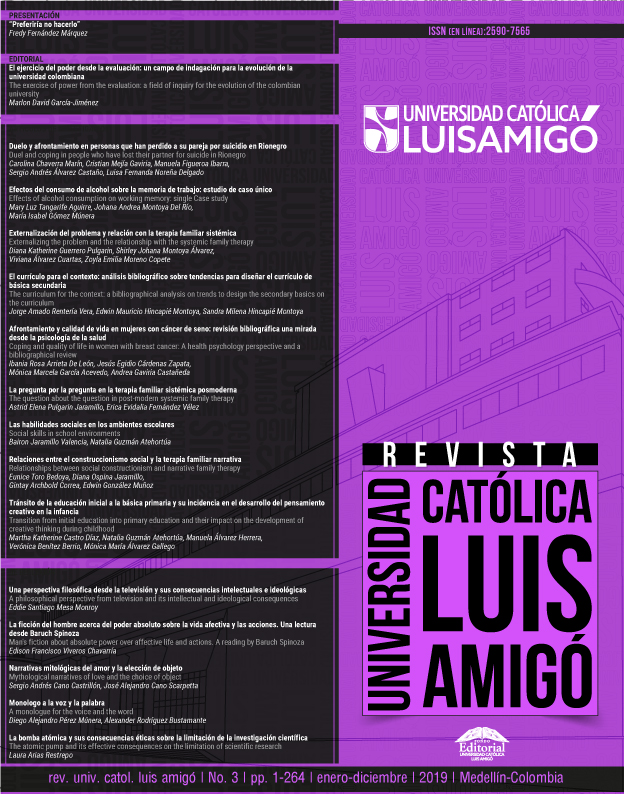Transition from initial education into primary education and their impact on the development of creative thinking during childhood
DOI:
https://doi.org/10.21501/25907565.3265Keywords:
School transition, Initial education, Primary education, Creative thinking.Abstract
The purpose of this article is to address the various perspectives on the transition from initial education to primary education and their impact on the development of creative thinking, which poses as a general objective, to understand the relationship between the transition between initial education into primary education and the development of creative thinking in boys and girls according to the perspective of their teachers in private and public schools in Medellín. A qualitative research was used with a case study methodology and a semi-structured interview, as the main instruments for the collection of information acquired from all the teachers participating in the research.During the process, there was evidence of the differences and similarities and how both public and private educational institutions are affected, as well as the expectations that all of the educators can perceived about the transition from initial education into primary education.
Downloads
References
Bulkeley, J., & Fabian, H. (2006). Well-being and Belonging During Early Educational Transitions. International Journal of Transitions in Childhood, 2, 18-31. Recuperado de https://extranet.education.unimelb.edu.au/LED/tec/pdf/journal2_bulkeley%20and%20fabian.pdf
Burgos, N. (2007). La enseñanza y el aprendizaje de la creatividad en el jardín de infantes. Pensamiento divergente, integración cultural y escuela creativa. Santa Fe, Argentina: Homo Sapiens Ediciones.
Carabus, O., Freiria, J., y Adalgisa, M. (2004). Creatividad, actitudes y educación. Buenos Aires, Argentina: Editorial Biblos.
De Bono, E. (1994). El pensamiento creativo. El poder del pensamiento lateral para la creación de nuevas ideas. Barcelona, España: Ediciones Paidós Ibérica, S.A.
De la torre, S. (2004). Aprender de los errores, el tratamiento didáctico de los errores como estrategias innovadoras. Buenos Aires, Argentina: Editorial Magisterio del Río de la Plata.
De Zubiría, M., y De Zubiría, J. (1992). Biografía del pensamiento. Estrategias para el desarrollo de la inteligencia. Bogotá, Colombia: Cooperativa Editorial Magisterio.
Fisher, R. (2013). Diálogo Creativo. Hablar para pensar en el aula. Madrid, España: Ediciones Morata, S.L.
Fondo de las Naciones Unidas para la Infancia (UNICEF). (2012). Preparación para la escuela y las transiciones. Nueva York, Estados Unidos: UNICEF. Recuperado de https://www.unicef.org/cfs/files/CFS_School_SP_Web_final_21.2.13.pdf
Galeano, E. (2004). Diseño de proyectos en la investigación cualitativa. Medellín, Colombia: Fondo Editorial Universidad Eafit.
González, A. (1995). Proyecto PRYCREA. Pensamiento reflexivo y creatividad. La Habana, Cuba: Editorial Academia.
González, A. (1996). Desarrollo de la creatividad, el pensamiento y el aprendizaje a través de la ciencia ficción. Proyecto PRYCREA. La Habana, Cuba: Editorial Academia.
González, P. M. (2001). La evaluación del aprendizaje: tendencias y reflexión crítica. Revista Cubana Educ Med Super, 15(1), 85-96. Recuperado de http://www.bvs.sld.cu/revistas/ems/vol15_1_01/ems10101.pdf
Hernández Ortiz, M. S. (2015). Estrategias didácticas empleadas por los docentes en la transición escolar entre los niveles de educación inicial y primaria del NER 295, Municipio Arístides Bastidas, Estado Yaracuy. Revencyt, 20, 45-61. Recuperado de http://www.grupocieg.org/archivos_revista/Ed.%2020%20(45-61)%20Hern%C3%A1ndez%20Ortiz%20-%20Junio%202015_articulo_id174.pdf
Ministerio de Educación Nacional, MEN. (2008). Evaluación para los aprendizajes. Altablero (44). Recuperado de https://www.mineducacion.gov.co/1621/article-162342.html
Ministerio de Educación Nacional, MEN. (8 de febrero de 1994). Ley General de Educación. [Ley 115 de 1994]. Recuperado de https://www.mineducacion.gov.co/1621/articles-85906_archivo_pdf.pdf
Sabino, C. (1992). El proceso de investigación. Caracas, Venezuela: Ed. Panapo.
Taylor, S., y Bogdan, R. (2000). Introducción a los métodos cualitativos de investigación. Barcelona, España: Paidós.
Vloger, P., Crivello, G., y Woodhead, M. (2008). La investigación sobre las transiciones en la primera infancia: análisis de nociones, teorías y prácticas. Cuadernos sobre desarrollo infantil temprano (48). La Haya, Países Bajos: Fundación Bernard Van Leer. Recuperado de https://www.oei.es/historico/pdf2/analisis_transiciones_primera_infancia.pdf
Downloads
Published
How to Cite
Issue
Section
License
PROPIEDAD INTELECTUAL
Los autores son moral y legalmente responsables del contenido de sus artículos, así como del respeto a los derechos de autor. Por lo tanto, éstos no comprometen en ningún sentido a la Universidad Católica Luis Amigó.
La reproducción de los artículos se regirá conforme a lo descrito en http://creativecommons.org/licenses/by-nc-sa/4.0/

